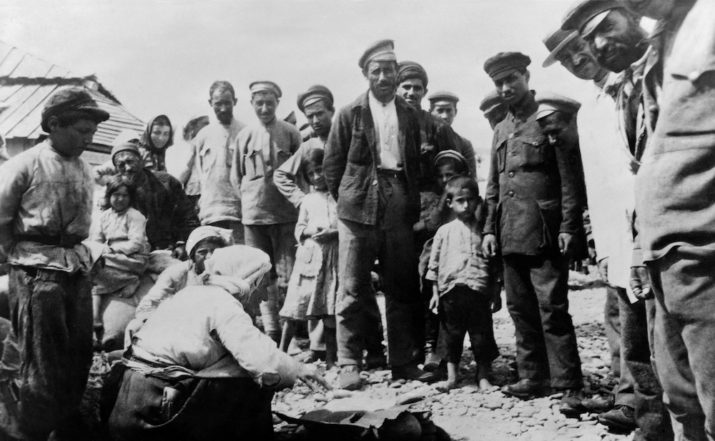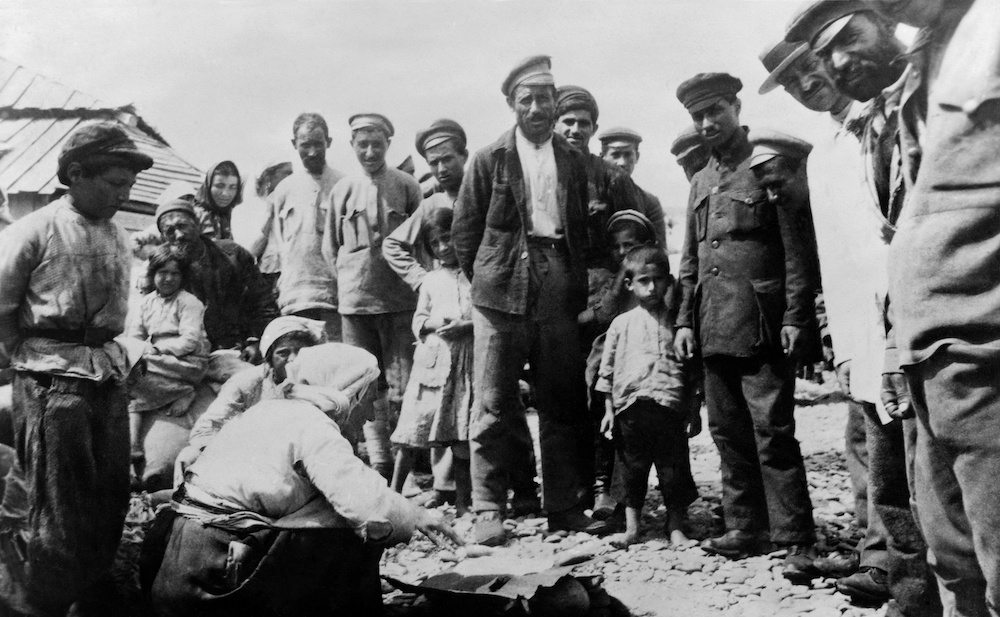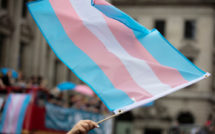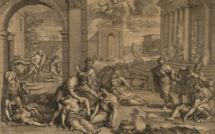

This is part of our Campus Spotlight on the University of Washington.
The First and Second World Wars were human-made catastrophes that killed upwards of eighty million people, including tens of millions of civilians. They reshaped the lives of all who survived them, as well as all of those who were born after. This course has two objectives: first, to investigate the histories of World Wars I and II, questioning major narratives and asking big questions along the way. We will pay particular attention to the ways the world wars affected diverse parts of the world differently, and explore how race, gender, sexuality, civilian status, and technology shaped war experiences. The second objective is to investigate and learn digital history skills and methods. Together, we will learn to use and evaluate digitized historical data and harness the power of data science and digital humanities tools to analyze and represent the World Wars, including to an audience outside of our class.
Three workshops in digital humanities (DH) and data skills form the spine of this course. The aim of these workshops is to explore how we can transfer our skills as historians—including critically evaluating different kinds of information and sources and constructing arguments—to the realm of digital humanities and data science. Throughout the course, each student will develop a digital project of their own design that examines the history of the First or Second World War. No prior knowledge of digital tools or digital humanities is required. While absolute beginners are welcome and encouraged, those who already have digital skills will find much that is new to them. Final projects can be in one of two areas: (a) a data science project (data visualization or analysis) or b) a public-facing podcast. Data science minors are encouraged to choose the data science project.
Required texts
Books, to buy:
- Remarque, Erich Maria. All Quiet on the Western Front. New York: Ballantine Books, 1982. Originally published Any edition of this text is fine, and it is widely available online.
- Takei, George, Justin Eisinger, and Steven Scott. They Called Us Enemy. Marietta, GA: Top Shelf Productions, 2019. (graphic novel)
- Weinberg, Gerhard L. World War II: A Very Short Introduction. Oxford: Oxford University Press, 2014.
Books, available for free at the library:
- Kluger, Ruth. Still Alive: A Holocaust Girlhood Remembered. New York: Feminist Press at CUNY, 2003.
- Morrow, John H. The Great War: An Imperial History. London: Routledge, 2004.
- Broussard, Meredith. Artificial Unintelligence: How Computers Misunderstand the World. Cambridge: MIT Press, 2018.
- Michael Kort, ed. The Columbia Guide to Hiroshima and the Bomb. Columbia: Columbia University Press, 2007.
Other readings: Many additional assigned readings are linked on the course website and provided as PDFs.
Assignments
There is an assignment due each week (except the first half-week) in this class. They fall into three categories:
- Digital history workshop assignments, which teach DH skills. We will have three of these workshops throughout the quarter. Workshop assignments are graded on a scale of 1-10. (30% of total grade)
- Online mini-quizzes, which assess your understanding of the World Wars and major course themes. These quizzes will be completed online outside of class time and will ask 1-3 questions in the form of short essays, primary source analysis, or identifications. The breakout rooms in our Zoom meetings will prepare you for these assignments, which will be graded on a scale from 1-10. (30% of total grade)
- The final DH project/project proposal, which asks you to use your new DH skills to ask and answer a historical question related to our course content. Your initial proposal will try out a very short and basic version of a digital project in one of these two areas: (a) a data science project (data visualization or analysis) or b) a public-facing podcast. The project must explain some aspect of the history of the world wars and must draw on at least one primary source and one secondary source from the course to put your research in context. Group work is optional. (40% of total grade)
Assignment schedule
Week 1 – no assignment
Week 2 – DH Workshop Assignment 1
Week 3 – Mini-Quiz A
Week 4 – DH Workshop Assignment 2
Week 5 – Mini-Quiz B
Week 6 – Mini-Quiz C
Week 7 – DH Workshop Assignment 3
Week 8 – Mini-Quiz D
Week 9 – Final Project Proposal
Week 10 – Mini-Quiz E
Week 11 – Final DH Project due
Course schedule
Week 1
Day 1: Introduction. What is military history? How is this class digital?
Week 2
Day 1: Camps Pt. 1 in the Empires of 1900
- John H. Morrow, The Great War: An Imperial History (London: Routledge, 2004), Chapter 1 “The Origins of War, 1871-1914.”
- Winston Churchill, The River War Vol. II: An Historical Account of the Re-Conquest of the Soudan (London: Longmans, Green, & Co., 1899), pages 155-164, 198-200, 219-227.
- Maja Lynn, “Mapping the Herero and Nama Genocide, 1904-1907,” ARCGIS Storymaps, October 29, 2020.[1]
Day 2: 1914, The Great War begins / Digital workshop 1: What is data? What are the Digital Humanities (DH)?
- John H. Morrow, The Great War: An Imperial History, Chapter 2 “1914: The ‘Big Show” Opens.’”
- 3 short accounts from the beginning of war, from the instructor’s archive: Julian Grenfell/Franz Blumenfeld/Charles Walter Barton.
- Meredith Broussard, Artificial Unintelligence: How Computers Misunderstand the World (Cambridge: MIT Press, 2018), Chapters 1 and 2.
Week 3
Day 1: Soldiers
- David Olusoga, The World’s War (London: Head of Zeus, 2014), “Chapter 1: ‘Weltkrieg’ A New Concept: The World’s War.”
- Erich Maria Remarque, All Quiet on the Western Front, Chapters 1-3.
- Students with Last Names A-M: A Chief is a Chief by the People: An Autobiography of Stimela Jason Jingoes (London: Oxford University Press, 1975), selection.
- Students with Last Names N-Z: Joe Lunn, Memoirs of the Maelstrom: A Senegalese Oral History of the First WW (Portsmouth NH: Heinemann 1999), Chapter 5 “To Meet Death Far Away: The Senegalese in the Trenches.”
Day 2: Civilians and home fronts
- Erich Maria Remarque, All Quiet on the Western Front, Chapters 7-8.
- Tammy Proctor, Civilians in a World at War 1914-1918 (New York: NYU Press, 2010), Introduction & Chapter 7 “Civilians Behind the Wire.”
- Archival accounts by WWI nurses, from the instructor’s archive.
Week 4
Day 1: 1915, The Armenian genocide and new technology
- John H. Morrow, The Great War: An Imperial History, Chapter 3 “1915: An Insignificant Year?”
- Erich Maria Remarque, All Quiet on the Western Front, Chapters 4-6.
- Wilfred Owen, “Dulce et Decorum Est” (1920).
Day 2: 1916, The turning point? / Digital workshop 2: Critical data studies: theory and politics
- John H. Morrow, The Great War: An Imperial History, Chapter 4 “1916: Total War.”
- Meredith Broussard, Artificial Unintelligence: How Computers Misunderstand the World (Cambridge: MIT Press, 2018), Chapters 3 and 7.
- Selections from W. E. B. Du Bois, Whitney Battle-Baptiste, and Britt Rusert, W.E.B. Du Bois’s Data Portraits: Visualizing Black America: The Color Line at the Turn of the Twentieth Century (Princeton: Princeton Architectural Press, 2018).
Week 5
Day 1: 1917, The Russian Revolution, America joins the war
- John H. Morrow, The Great War: An Imperial History, Chapter 5 “1917: Climax”
- Erich Maria Remarque, All Quiet on the Western Front, Chapters 9-10.
- Tammy Proctor, Civilians in a World at War 1914-1918 (New York: NYU Press, 2010), Chapter 8 “Civil War and Revolution.”
- Selections from Isabel Wilkerson, The Warmth of Other Suns: The Epic Story of America’s Great Migration (New York: Vintage Books, 2010), pages 8-15, 36-46, 160-164.
Day 2: 1918, The day(s) the war ended…
- John H. Morrow, The Great War: An Imperial History, Chapter 6 “1918: Denouement.”
- Erich Maria Remarque, All Quiet on the Western Front, Chapters 11-12.
Week 6
Day 1: The interwar: democracy and fascism face off in Spain!
- John H. Morrow, The Great War: An Imperial History, Chapter 6 “The Postwar World: A ‘Peace to End Peace?””
- Letter from “S.” to Magnus Hirschfeld and the Scientific Humanitarian Committee, 1915, from the instructor’s archive.
Day 2: Digital workshop 3: Public digital history
Listen and compare:
- Podcast Episode: “Fu-Go,” RadioLab, WNYC Studios, April 25, 2019.[2]
- Podcast Episode: Angela King, “These Black Women Got the Mail Delivered in Europe in WWII. A Push is On to Honor the 6888th.” KUOW Radio, Sept. 1, 2020.[3]
- Podcast Episode: Angela King, “A Conversation with One of the Last Survivors of the 6888th – The Only Black Women’s Unit to Serve Overseas in WW2.” KUOW Radio. Sept. 2, 2020.[4]
Week 7
Day 1: The Second World War, Japanese invasion of China through German invasion of Poland to Japan’s surrender, a quick overview
- Gerhard Weinberg, World War II: A Very Short Introduction, pages 1-10, 12 – 65.
- Michael Kort, ed. The Columbia Guide to Hiroshima and the Bomb (Columbia: Columbia University Press, 2007), Chapter 3 “The Pacific War.”
Day 2: The German-Soviet war and the turning point at Stalingrad
- Gerhard Weinberg, World War II: A Very Short Introduction, 66-125.
- Karl Fuchs, “A German Soldier’s Letters from the Eastern Front,” 1941
Week 8
Day 1: Japan’s Empire and discussing the final digital project
- Cook and Cook, ed. Japan at War: An Oral History (The New Press, 2000), Part One “An Undeclared War” and Part Five “One Hundred Million Die Together.”
- Selections, E.B. Sledge, With the Old Breed: At Peleliu and Okinawa(Oxford: Oxford University Press, 1981), excerpt.
Day 2: Night witches, rubble frauen, and hamsters: Women and the Second World War
- Ruth Kluger, Still Alive, Part I, Vienna, pages 13-60.
Week 9
Days 1 and 2: No class meetings this week
- George Takei, They Called Us Enemy (Top Shelf Books: 2019).
Week 10
Day 1: Camps II (including the Holocaust)
- Ruth Kluger, Still Alive, Part II “The Camps” and Part III “Germany” through to page 170
Day 2: The technology of WWII: The computer, the long-range bomber, and the nuclear bomb
- Michael Kort, ed. Columbia Guide to Hiroshima and the Bomb, Chapter 4 “The Decision to Drop the Bomb” and Chapter 5 “The Japanese Government, Ketsu-Go, and Potsdamn.”
- Sheldon Garon, “On the Transnational Destruction of Cities: What Japan and the United States Learned from the Bombing of Britain and Germany in the Second World War,” Past and Present 247 (1) (2020), 235-271.
Week 11
Day 1: 1945 and the world the wars made: war crimes trials—Did the ethics of war change?
Taylor Soja is a PhD candidate in British and imperial history at the University of Washington, and beginning in fall 2022 Assistant Professor of History at Illinois State University. Her work has appeared in Gender & History, and her research is funded by a Mellon – Council for European Studies Dissertation Completion Fellowship. She is also committed to digital and public history, and co-directed the project Digital World Wars.
Laurie Marhoefer is the Jon Bridgman Endowed Professor in History at the University of Washington. Marhoefer’s research is on queer and trans histories in modern Germany and the twentieth-century world. His forthcoming book on the global history of gay rights in the 1930s is Racism and the Making of Gay Rights: A Sexologist, his Student, and the Empire of Queer Love (University of Toronto Press, 2022) and he is also at work on a book on trans people in Nazi Germany.
References
[1] https://storymaps.arcgis.com/stories/94376513466f416f9ea86f4c4e51122b
[2] https://www.wnycstudios.org/podcasts/radiolab/articles/fu-go
[3] https://www.kuow.org/stories/these-black-women-got-the-mail-delivered-in-europe-in-ww2-a-push-is-on-to-honor-the-6888th
[4] https://www.kuow.org/stories/a-conversation-with-one-of-the-surviving-women-from-the-6888th-unit
Photo: Armenian refugees on Black Sea beach at Novorossiysk. 1920. Turkish vs. Armenians conflict continued after WW1, ending in 1921, with the Treaty of Kars between Bolshevik Russia and Turkey.
Published on April 18, 2022.




